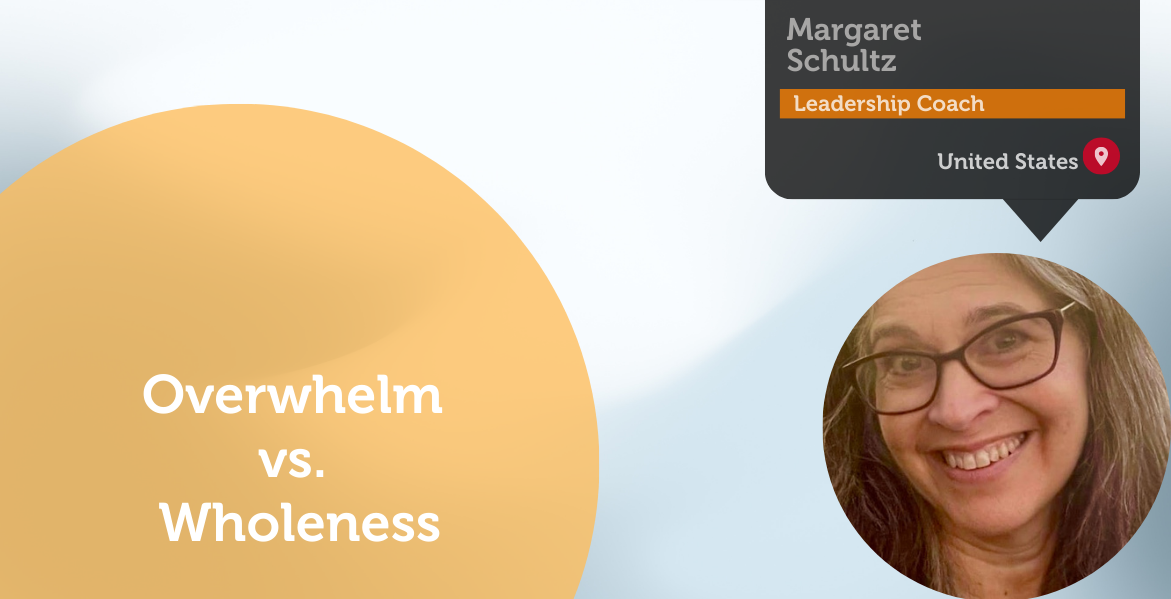A Coaching Power Tool By Margaret Schultz, Leadership Coach, UNITED STATES

How to Shift From Overwhelm vs. Wholeness
Overwhelm is my kryptonite. I take on too many things and eventually, I hit a wall. I either feel burned out or paralyzed and can’t move forward. It feels like there’s no way I can accomplish or do anything well. I am the mother of two young adults, one of them deals with ongoing health issues. This often has me on edge. I am also the main support for my aging parents, who live 3,000 miles away. And I hold down a full-time job that is constantly changing. Recently, my parents were forced to move, and I needed to fly in to help with that process. That same week, my oldest child was hospitalized…. I was paralyzed. There were many things that needed to be taken care of, but it was seemingly impossible to do anything. I was completely overwhelmed.
Meaning of Overwhelm vs. Wholeness
The term “overwhelm” generally has negative definitions: “to make helpless, overcome, overpower, buried.” There are positive uses of the word as well, as in, “overwhelmed with gratitude.” However, most often, the feeling of overwhelm can stop us cold, and stop us from being able to access our best selves.
In overwhelm, the world can seem too much for us and it feels like there is no way we can succeed. In a coaching environment, this can mean, the client comes to us buried in their issue, their story, whatever it is they are going through and, this overwhelm is REAL. It feels and is experienced as too much, impossible, and can cause the client to feel scattered and unclear about how to proceed.
Some of the synonyms of Overwhelm I found on Dictionary.com are helpful in illustrating the effect: “crush, devastate, floor, grind (down), oppress, overcome, overmaster, overpower, swamp…” I can honestly say that I have felt most of these descriptors. Who wants to feel “grounded down”?
In my case, there were many actual “things” that I needed to handle, along with the big feelings that went along with all those things. This led to overwhelm and a feeling of helplessness and paralysis. Since I needed to move through my overwhelm, I brought my issue to a peer coach. In our coaching session, through their challenging questions, I was able to shift my perspective and found that indeed, I had so much going on, but I also had it in me, to move forward. The coaching questions evoked my awareness that I was (and am) complete, I have everything in me that I need, even when things are hard.
In the Merriam-Webster dictionary, “wholeness” is defined as “unbroken completeness with nothing lacking… a whole life includes sadness and happiness. Sickness, as well as health.”
Wholeness truly means accepting “the whole enchilada.” The hard, the sad, the mad, the scared, and the glad are all parts of you. The gratitude and the resentment together make you whole.-Tinybuddha.com
What I love about this tinybuddha.com definition is that being whole doesn’t mean we are “perfect” or that we are only strong, only positive. Instead, being whole is an acceptance of all of who we are and that is what makes us strong and our best selves.
I created this Power Tool because I am often overwhelmed, there is so much I juggle these days, and sometimes it seems too much and impossible to handle. Too often, I feel scattered and unable to think clearly. Problem-solving seems impossible and I lose my ability to reason, and I lose self-confidence. I assume I am not the only one who feels this way. This Power Tool has been so empowering for me. This tool helps me to re-connect with my whole self, which helps me to re-connect with self-acceptance and the knowledge that I am enough and have the tools to move forward.
Our role as a coach is to challenge our clients to recognize their wholeness, their completeness, through powerful questions. When we Evoke Awareness, the client can recognize where their strengths lie, or see what they may be afraid of. The strength of all the power tools is to help a client shift perspective and see the world from a different angle. We ask challenging questions to support our clients in connecting with their full selves so they can feel whole, and recognize they have everything they need.
Shifting from feeling overwhelmed to feeling whole can be profound. Supporting our clients on this journey is powerful. It means that anything is possible. It will not mean they won’t ever feel overwhelmed again, hardly. And feeling whole includes both their confidence and their vulnerability. Being whole includes their complete self, this is what makes it so empowering.